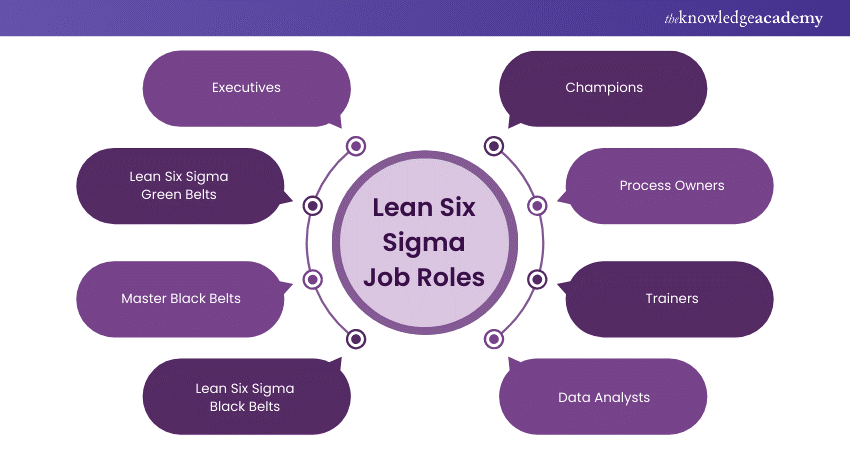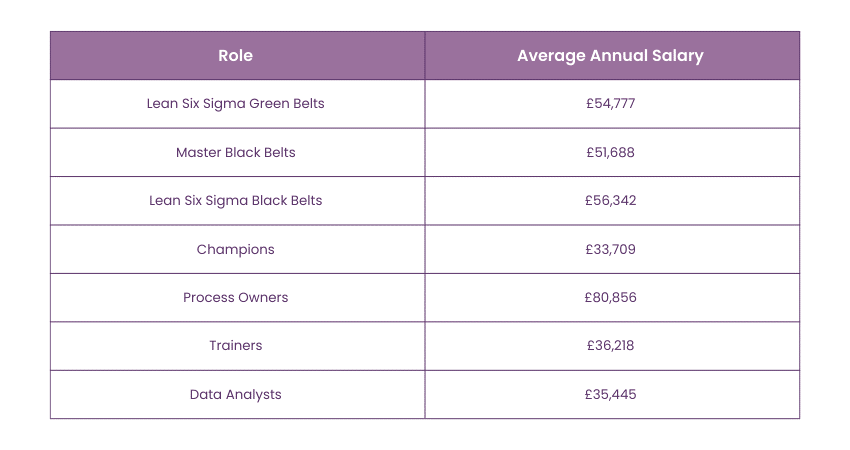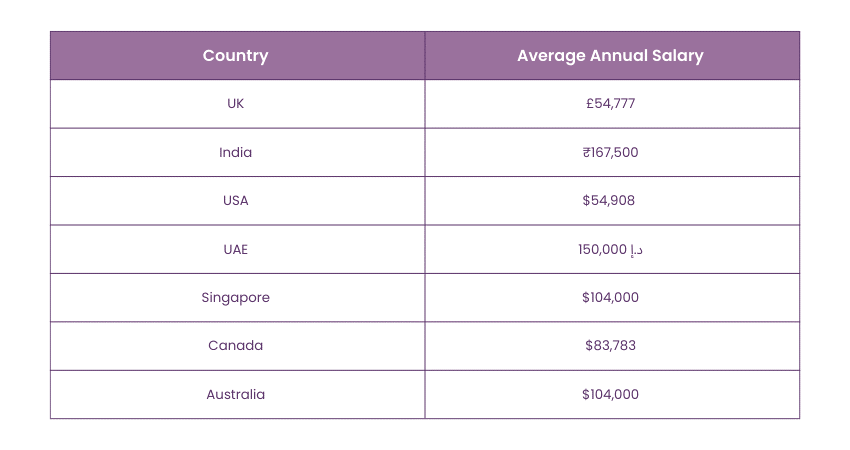We may not have the course you’re looking for. If you enquire or give us a call on +44 1344 203999 and speak to our training experts, we may still be able to help with your training requirements.
Training Outcomes Within Your Budget!
We ensure quality, budget-alignment, and timely delivery by our expert instructors.

Step into the dynamic universe of Lean Six Sigma Roles, where professionals craft efficiency and safeguard quality. From strategic leaders to frontline champions, each role is vital in the symphony of operational perfection. Join us as we uncover the mysteries of these roles, revealing the secret ingredients that elevate good companies to greatness.
Explore the diverse roles in Lean Six Sigma, from guiding strategic vision to executing hands-on projects that drive tangible process improvements. Dive into the world of Lean Six Sigma Roles, where innovation merges with tradition. Read ahead to learn more!
Table of Contents
1) Lean Six Sigma Job Roles
2) Salaries After Getting Six Sigma Certification
a) Salary Based on Job Role
b) Salary Based on Location
c) Salary Based on Experience Level
3) Conclusion
Lean Six Sigma Job Roles
Lean Six Sigma offers a range of job roles, each crucial in driving organisational excellence. Here are some of the Lean Six Sigma job roles along with their responsibilities:

Executives
Executives are pivotal in the triumph of Lean Six Sigma endeavours, offering guidance and backing. Their mandate includes charting the strategic course for the program, distributing resources, and confirming that the program’s objectives are in harmony with the company’s overarching aims.
Responsibilities:
a) Chart the strategic course for Lean Six Sigma programs.
b) Distribute resources to support improvement initiatives.
c) Confirm alignment of program objectives with overall company goals.
Lean Six Sigma Green Belts
Green Belts serve as integral team players, versed in Lean Six Sigma methodologies, and provide support to Black Belts and Master Black Belts in enhancing processes. While they contribute to projects on a part-time basis, they also uphold their standard job duties.
Responsibilities:
a) Serve as integral team members.
b) Use Lean Six Sigma methodologies.
c) Support Black Belts and Master Black Belts in process enhancement.
d) Contribute part-time while maintaining standard job duties.
Master Black Belts
Master Black Belts are experts in Lean Six Sigma methodology and are responsible for training and mentoring Black Belts and Green Belts. They also lead complex improvement projects and provide guidance on strategy and implementation.
Responsibilities:
a) Are experts in Lean Six Sigma.
b) Train and mentor Black Belts and Green Belts.
c) Lead complex improvement projects.
d) Provide guidance on strategy and implementation.
Lean Six Sigma Black Belts
Black Belts are full-time project leaders who are responsible for leading process improvement projects from start to finish. They work closely with Green Belts and Master Black Belts to identify opportunities for improvement, analyse data, and implement solutions.
Responsibilities:
a) Are full-time project leaders.
b) Lead process improvement projects end-to-end.
c) Collaborate with Green Belts and Master Black Belts.
d) Identify improvement opportunities, analyse data, and implement solutions.
Champions
Champions are senior leaders who are responsible for promoting and supporting Lean Six Sigma within their organisation. They provide resources and remove barriers to ensure the success of improvement projects.
Responsibilities:
a) Are senior leaders.
b) Promote and support Lean Six Sigma within the organisation.
c) Provide resources and remove barriers for improvement projects.
Process Owners
Process Owners take charge of the comprehensive management and optimisation of a designated business process. Collaborating intimately with Black Belts and Green Belts, they pinpoint areas for enhancement and actualise solutions.
Responsibilities:
a) Manage and optimise specific business processes.
b) Collaborate closely with Black Belts and Green Belts.
c) Identify areas for enhancement and implement solutions.
Trainers
Trainers carry the mantle of imparting Lean Six Sigma education across the organisational spectrum. They are the custodians of equipping the workforce with the necessary acumen and competencies to partake in the journey of continuous improvement.
Responsibilities:
a) Impart Lean Six Sigma education across the organisation.
b) Equip the workforce with necessary skills for continuous improvement.
Data Analysts
Data Analysts play a crucial role in Lean Six Sigma initiatives, tasked with the aggregation, examination, and interpretation of data to discern patterns and avenues for advancement. Their collaboration with Black Belts and Green Belts is crucial to foster decisions anchored in data.
Responsibilities:
a) Play a crucial role in Lean Six Sigma initiatives.
b) Aggregate, examine, and interpret data.
c) Identify patterns and opportunities for advancement.
d) Collaborate with Black Belts and Green Belts for data-driven decisions.
Boost your career with Lean Six Sigma Green Belt Training for process excellence and efficiency!
Salaries After Getting Six Sigma Certification
Here are the Lean Six Sigma salaries after getting certification based on job role, country and experience:
Salary Based on Job Role
Average annual salaries for various Lean Six Sigma Roles are as follows:

Source: Glassdoor
1) Lean Six Sigma Green Belts: These professionals earn an average annual salary of £54,777. Green Belts assist with process improvement projects and work on smaller improvements within a company.
2) Master Black Belts: They earn around £51,688 per year. Master Black Belts possess significant expertise and the skill in Lean Six Sigma technique. They lead and manage multiple improvement projects.
3) Lean Six Sigma Black Belts: These professionals earn an average of £56,342 annually. Black Belts lead improvement projects and train Green Belts in Lean Six Sigma techniques.
4) Champions: Champions earn about £33,709 per year. They are responsible for promoting and supporting Lean Six Sigma within an organisation.
5) Process Owners: Process Owners earn an average salary of £80,856. They are responsible for the overall performance and improvement of a specific process within a company.
6) Trainers: Trainers in Lean Six Sigma earn around £36,218 per year. They deliver training courses on Lean Six Sigma methodologies to employees.
7) Data Analysts: Data Analysts earn an average of £35,445 annually. They collect, analyse, and evaluate data to identify opportunities for process improvement.
Salary Based on Location
The table shows the average annual salaries for Lean Six Sigma Roles across different countries.

Source: Glassdoor
1) United Kingdom (UK): Lean Six Sigma experts typically make about £54,777 a year. They’re quite sought after, especially in fields like manufacturing, healthcare, and finance.
2) India: In India, the going rate for these roles is around ₹167,500 annually. There’s been a noticeable uptick in Lean Six Sigma usage, mainly in the IT and services sectors.
3) United States of America (USA): The average yearly pay for Lean Six Sigma practitioners is $54,908. It’s a well-established practice in the US, with many industries applying it to enhance their processes.
4) United Arab Emirates (UAE): The typical salary is around د.إ 150,000 per year. Lean Six Sigma is becoming more popular, particularly in construction, hospitality, and healthcare.
5) Singapore: Professionals can expect to earn about $104,000 annually. The country prioritises quality and efficiency, so these skills are in high demand.
6) Canada: The average salary is C$83,783 per year. Lean Six Sigma is utilised across various sectors, including manufacturing, healthcare, and tech.
7) Australia: The average yearly earnings are around $104,000. The strong economy and emphasis on improvement mean Lean Six Sigma skills are valued.
Salary Based on Experience Level
The table shows the average annual salaries for Lean Six Sigma Roles based on experience levels:

Source: Glassdoor
1) Entry-level: Individuals just beginning their careers in Lean Six Sigma command an average yearly income of £47,947. This group generally includes those who are freshly certified and embarking on their Lean Six Sigma journey.
2) Mid-level: Those who have accrued some practical experience in implementing Lean Six Sigma principles and are progressing in their careers also receive an average salary of £47,947 per year. They are developing their expertise but have not yet ascended to higher-level positions.
3) Experienced: Seasoned Lean Six Sigma practitioners, recognised for their extensive experience and successful project leadership, are rewarded with an average annual salary of £54,777. These experts often occupy senior roles and are responsible for significant process improvements within their organisations.
Become a Lean Six Sigma expert - join our Lean Six Sigma Black Belt Training today!
Conclusion
Lean Six Sigma Roles are not just job titles; they represent a commitment to excellence and efficiency. By embracing these roles and their responsibilities, organisations can drive meaningful change, streamline processes, and foster a culture of continuous improvement. Lean Six Sigma is more than just a methodology; it's a philosophy that transforms businesses from good to great.
Accelerate your career with our Lean Six Sigma Certification Training -join today and achieve excellence!
Frequently Asked Questions

Six Sigma management provides strategic direction, resource allocation, and goal alignment. They help project teams overcome difficulties and promote a culture of continual development.

Lean Six Sigma pushes to increase efficiency, decrease waste, and improve process quality. This results in better customer satisfaction and cost savings for organisations.

The Knowledge Academy takes global learning to new heights, offering over 30,000 online courses across 490+ locations in 220 countries. This expansive reach ensures accessibility and convenience for learners worldwide.
Alongside our diverse Online Course Catalogue, encompassing 17 major categories, we go the extra mile by providing a plethora of free educational Online Resources like News updates, Blogs, videos, webinars, and interview questions. Tailoring learning experiences further, professionals can maximise value with customisable Course Bundles of TKA.

The Knowledge Academy’s Knowledge Pass, a prepaid voucher, adds another layer of flexibility, allowing course bookings over a 12-month period. Join us on a journey where education knows no bounds.

The Knowledge Academy offers various Lean Six Sigma Certification Training, including Lean Six Sigma Green Belt, Lean Six Sigma Yellow Belt and Lean Six Sigma Black Belt. These courses cater to different skill levels, providing comprehensive insights into Lean Six Sigma Yellow Belt Benefits.
Our Business Improvement Blogs cover a range of topics related to Lean Six Sigma Certification, offering valuable resources, best practices, and industry insights. Whether you are a beginner or looking to advance your Business skills, The Knowledge Academy's diverse courses and informative blogs have got you covered.
Upcoming Business Improvement Resources Batches & Dates
Date
 Lean Six Sigma Green Belt
Lean Six Sigma Green Belt
Mon 13th Jan 2025
Mon 3rd Feb 2025
Mon 24th Mar 2025
Mon 26th May 2025
Mon 21st Jul 2025
Mon 15th Sep 2025
Mon 24th Nov 2025







 Top Rated Course
Top Rated Course



 If you wish to make any changes to your course, please
If you wish to make any changes to your course, please


